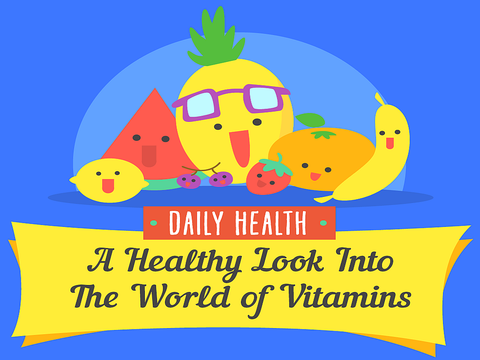by Dr. Nikola Djordjevic
MedAlertHelp.org
August 9, 2018
Staying fit is one of the most important things that one should do in order to lead a healthy lifestyle. People engage in different activities such as running and playing different sports, but proper nutrition which includes the consumption of vitamin-rich foods is considered to be of the same importance. This is why, especially nowadays, cooking your food is very important, as the best way to properly supply your body with the vitamins it needs is to ingest them through food.
In certain cases, however, it is even necessary to take the right vitamin supplement to correct a deficiency or prevent it from developing. Vitamins have many important roles in our bodies, and vitamin deficiencies can cause a number of conditions, including cardiovascular issues, eye and skin disorders, problems with cholesterol, etc.
Vitamins can be divided into two groups: water-soluble (vitamin B complex, vitamin C) and fat-soluble (vitamins A, D, E, and K). Today’s article is about the latter kind, which dissolves in fat and can be stored in the liver and fat tissues until needed.
Vitamin A is essential for growing and maintaining healthy teeth, as well as skeletal, and various soft tissue. It can be found in cod liver oil, liver (beef, pork, and fish), sweet potatoes, carrots, and broccoli leaves. The deficiency signs are blindness, xerophthalmia, and skin disease.
Vitamin D, also known as the “sunshine” vitamin, helps prevent or slow down the progression of osteoporosis, thus reducing the incidence of bone fractures. It can be found in salmon, cremini mushrooms, breakfast cereal, tofu, and eggs. The deficiency signs include frequent infections, fatigue, and bone and back pain.
Vitamin E is useful in balancing cholesterol, it fights free radicals, and prevents disease development. It can be found in wheat germ oil, sunflower seeds, almonds, hazelnut oil, and mamey sapote. The deficiency signs are muscle weakness, coordination and walking difficulties, numbness and tingling, vision deterioration, and immune system problems.
Vitamin K regulates normal blood clotting and helps in maintaining strong bones. It can be found in vegetables such as kale (cooked), mustard greens (cooked), spinach (raw), soybean oil, broccoli (cooked). The deficiency signs are easy bruising, gastrointestinal bleeding, excessive menstrual bleeding, and blood in the urine.
As we mentioned earlier, eating a diverse diet with adequate levels of vitamins is really important to stay healthy. This will help the body function properly, and reduce the risks of developing different diseases. For more quick facts about vitamins, see this infographic designed by MedAlertHelp.

